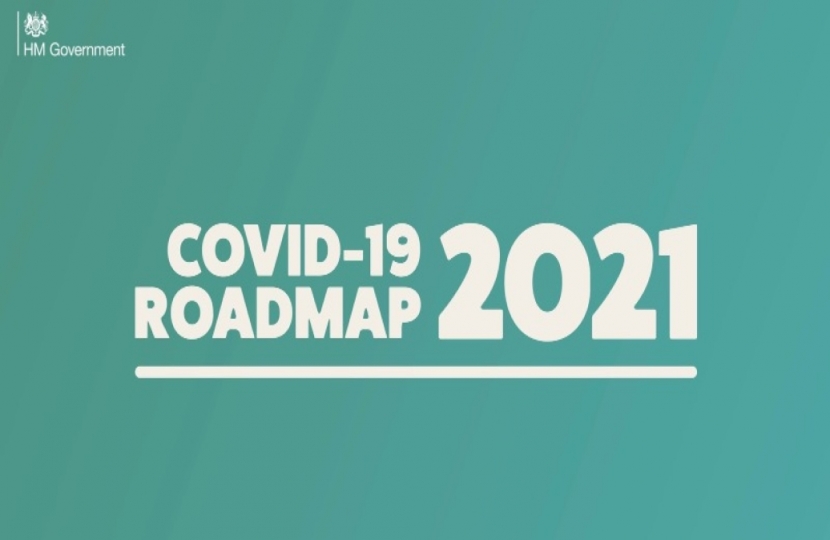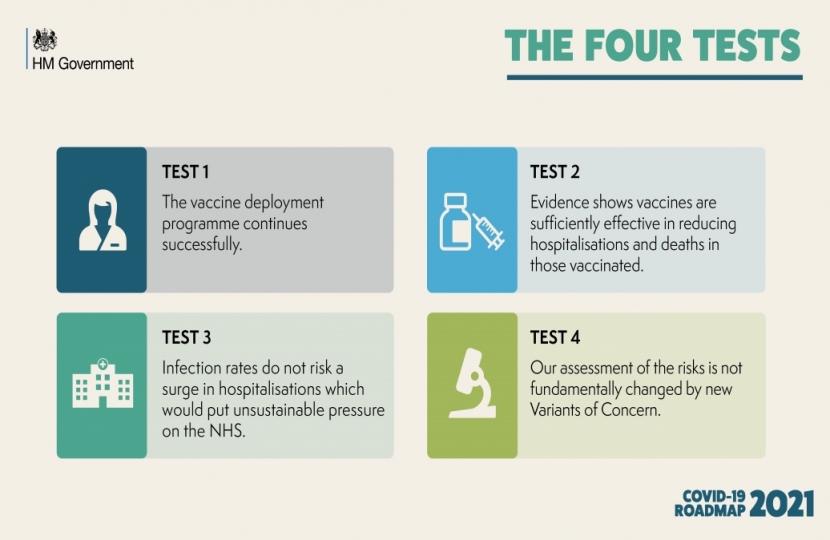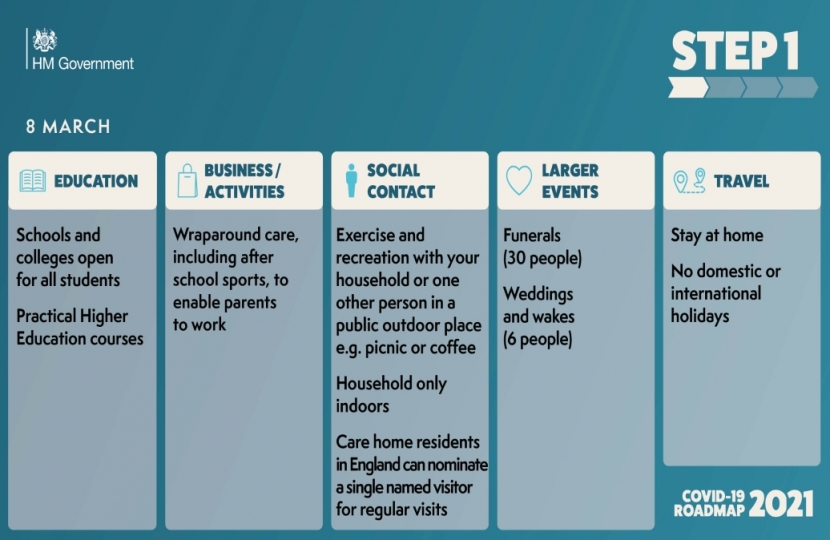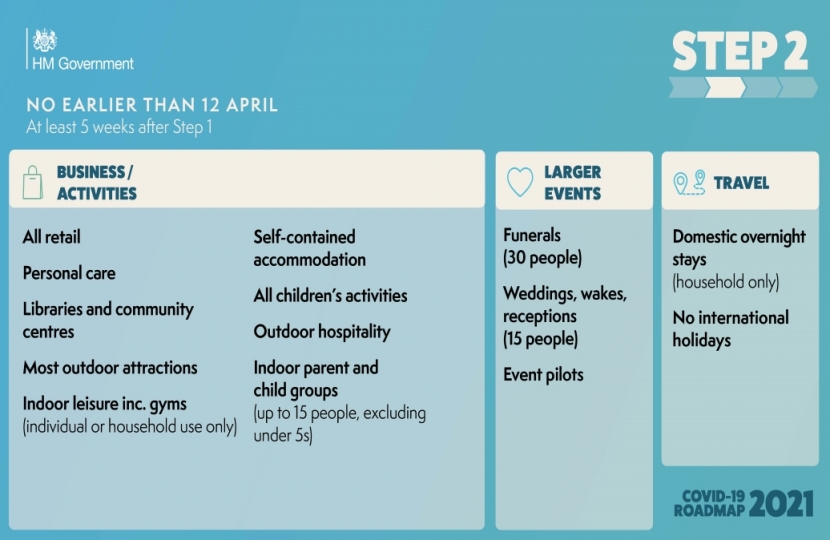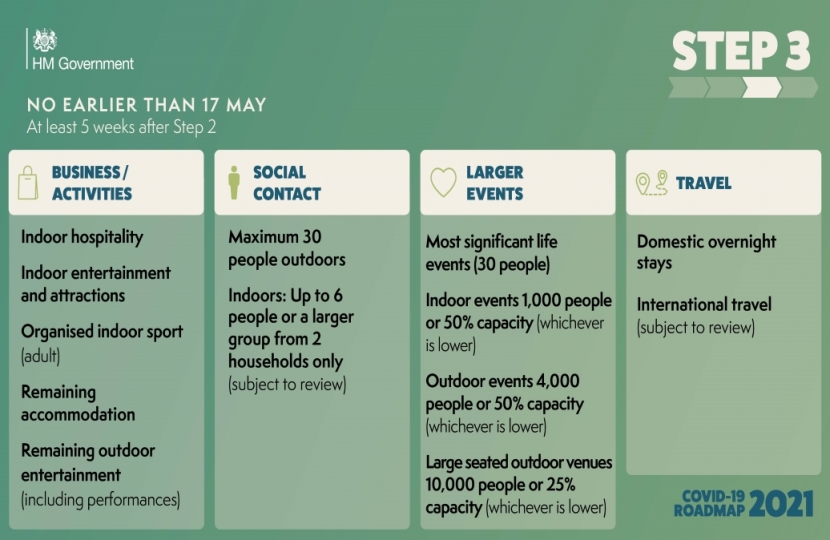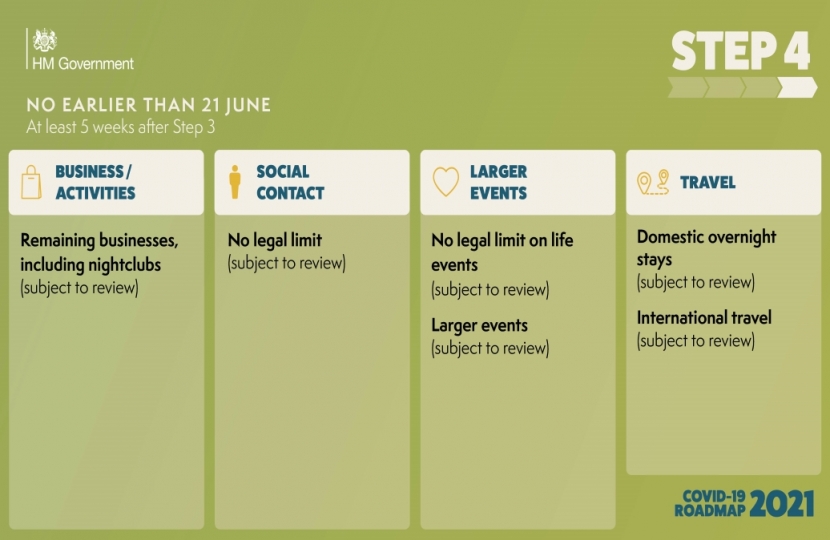As stated in the the Prime Minister's press release, the roadmap outlines the four steps for easing restrictions with dates being indicative and subject to change. Before proceeding to the next step, the Government will examine the data to assess the impact of previous easements. This assessment will be based on four tests:
- The vaccine deployment programme continues successfully.
- Evidence shows vaccines are sufficiently effective in reducing hospitalisations and deaths in those vaccinated.
- Infection rates do not risk a surge in hospitalisations which would put unsustainable pressure on the NHS.
- Our assessment of the risks is not fundamentally changed by new Variants of Concern.
Importantly, there will be a minimum of five weeks between each step: four weeks for the data to reflect changes in restrictions followed by seven days’ notice of the restrictions to be eased. This will give adequate time to assess the impact of each step and reduce the risk of having to re-impose restrictions at a later date.
Step Four Assessment: The four tests are currently being met therefore step four is due to proceed on 19 July.
In the Prime Minister's statement on Monday 5 April 2021, he stated:
We can’t be complacent. We can see the waves of sickness afflicting other countries and we’ve seen how this story goes.
We still don’t know how strong the vaccine shield will be when cases begin to rise, as I’m afraid that they will – and that’s why we’re saying: Please get your vaccine or your second dose when your turn comes.
And please use the free NHS tests – even if you don’t feel ill, because remember 1 in 3 people with this virus doesn’t have any symptoms - and you can get these tests from pharmacies or your local test site, you can even order them on gov.uk and get home deliveries."
In the Prime Minister's announcement on Monday 10 May 2021, he stated:
I want to begin by thanking everyone again for your patience and for the sacrifices you’ve been making.
[...]
So from next Monday we are updating the guidance on close contact between friends and family, setting out the risks for everyone to make their own choices.
This does not mean we can suddenly throw caution to the winds.
In fact, more than a year into this pandemic, we all know that close contact, such as hugging, is a direct way of transmitting this disease.
So I urge you to think about the vulnerability of your loved ones - whether they have had a vaccine, one or two doses, and whether there has been time for that vaccine to take effect.
Remember outdoors is always safer than indoors. And if you are meeting indoors, remember to open a window and let in the fresh air.
[...]
Today we are announcing the single biggest step on our roadmap and it will allow us to do many of the things we’ve yearned to do for a long time.
So let’s protect these gains by continuing to exercise caution and common sense.
In the Prime Minister's statement on Monday 14 June 2021, he stated:
When we set out on our roadmap to freedom a few months ago, we were determined to make progress that was cautious but irreversible. And step by step – thanks to the enormous efforts of the British people and the spectacular vaccine roll-out we now have one of the most open economies and societies in this part of the world.
And as we have always known and as the February roadmap explicitly predicted – this opening up has inevitably been accompanied by more infection and more hospitalisation. Because we must be clear that we cannot simply eliminate Covid – we must learn to live with it. And with every day that goes by we are better protected by the vaccines and we are better able to live with the disease.
[...]
[T]here are still millions of younger adults who have not been vaccinated and sadly a proportion of the elderly and vulnerable may still succumb even if they have had two jabs.
And that is why we are so concerned by the Delta variant that is now spreading faster than the third wave predicted in the February roadmap.
[...]
We will monitor the position every day and if after 2 weeks we have concluded that the risk has diminished then we reserve the possibility of proceeding to Step 4 and full opening sooner.
As things stand – and on the basis of the evidence I can see right now – I am confident we will not need any more than 4 weeks and we won’t need to go beyond July 19th. It is unmistakably clear the vaccines are working and the sheer scale of the vaccine roll-out has made our position incomparably better than in previous waves."
In the Prime Minister's statement on Monday 5 July 2021, he stated:
As we predicted in the roadmap we’re seeing cases rise fairly rapidly - and there could be 50,000 cases detected per day by the 19th and again as we predicted, we’re seeing rising hospital admissions and we must reconcile ourselves sadly to more deaths from Covid.
In these circumstances we must take a careful and a balanced decision. And there is only one reason why we can contemplate going ahead to step 4 - in circumstances where we’d normally be locking down further – and that’s because of the continuing effectiveness of the vaccine roll-out.
[...]
The risks of the disease which the vaccines have reduced but very far from eliminated. And the risks of continuing with legally enforced restrictions that inevitably take their toll on people’s lives and livelihoods - on people’s health and mental health. And we must be honest with ourselves that if we can’t reopen our society in the next few weeks, when we will be helped by the arrival of summer and by the school holidays, then we must ask ourselves when will we be able to return to normal?
And to those who say we should delay again; the alternative is to open up in the winter when the virus will have an advantage or not at all this year. And so again without pre-empting the decision on 12th July, let me set out today our five-point plan for living with Covid in the hope that it will give families and businesses time to prepare."
The four steps, as outlined in the Prime Minister's announcement on the 22 February, are as follows:
Step One
From 8 March
- The Clinically Extremely Vulnerable are advised to shield at least until the end of March.
Schools and Education Settings
-
Pupils and students in all schools and further education settings can safely return to face-to-face teaching, supported by twice-weekly testing of secondary school and college pupils.
-
Families and childcare bubbles will also be encouraged to get tested regularly.
-
Breakfast and afterschool clubs can also re-open - and other children’s activities, including sport, can restart where necessary to help parents to work.
-
Students on university courses requiring practical teaching, specialist facilities or onsite assessments will also return but all others will need to continue learning online, and we will review the options for when they can return by the end of the Easter Holidays.
Travel
- Stay at Home remains: if you do leave home for a permitted reason, you should always stay in your local area - unless it is necessary to go further, for example to go to work. Staying in your local area means stay in the village, town, or part of the city where you live.
Outdoor Recreation
-
You can leave home for recreation outdoors - such as a coffee on a bench or a picnic in a park - with your household or support bubble, or, when on your own, with one person outside your household (i.e. yourself and one other).
Care Homes
- Every care home resident will be able to nominate a named visitor, able to see them regularly provided they are tested and wear PPE.
From 29 March
Household Mixing
- Rule of Six will return outdoors, including in private gardens, and outdoor meetings of two households (i.e. yours and one other) will also be permitted on the same basis so that families in different circumstances can meet. Importantly, people from different households will still need to be socially distanced from one another when meeting outdoors. No household mixing is permitted indoors unless an exemption already applies.
Outdoor Sports
- Outdoor sports facilities – such as tennis and basketball courts, and open-air swimming pools – will be able to reopen in line with the wider social contact limits.
- Formally organised outdoor sports – for adults and under 18s - can also restart and will not be subject to the gatherings limits, but should be compliant with guidance issued by national governing bodies.
Travel
- People will no longer be legally required to stay at home but many lockdown restrictions will remain. Still work from home and minimise travel where possible.
Working
- People should continue to work from home where they can and minimise all travel wherever possible.
Step Two
From 12 April
Non-Essential Retail
- Non-essential retail will reopen, as will personal care including hairdressers and nail salons - such premises should only be visited alone or with household groups.
Indoor Leisure
- Indoor leisure facilities such as gyms will re-open.
Holiday Lets
- Holiday-lets will re-open, but only for use by individuals or household groups.
Hospitality
- Pubs and restaurants will begin to reopen outdoors with no curfew and no requirement for alcohol to be accompanied by a substantial meal. The requirement to order, eat and drink while seated (‘table service’) will remain.
Outdoor Recreation Facilities
- Zoos, theme parks and drive-in cinemas will re-open.
Libraries and Community Centres
- Public libraries and community centres will re-open.
Life Events
- Funerals can continue with up to 30 people.
- The numbers able to attend weddings, receptions and commemorative events such as wakes will rise to 15.
Driving Tests
- Driving tests may resume - restart of driving lessons in England and Wales from 12 April 2021, and the restart of driving tests in England and Wales from 22 April 2021, more information here.
Step Three
From 17 May
Meeting Outdoors
- Most restrictions on meetings outdoors will be lifted, subject to a limit of thirty.
Meeting Indoors
- You will be allowed to meet indoors subject to the Rule of Six or the meeting of two households (i.e. yours and one other).
Social Distancing
- New guidance on meeting friends and family will emphasise personal responsibility rather than government rules.
- You should stay 2 metres apart from anyone who is not in your household or support bubble where possible, or 1 metre with extra precautions in place (such as wearing face coverings) if you cannot stay 2 metres apart.
Care Homes
- The rules for care home residents visiting out and receiving visitors will change, allowing up to five named visitors (two at any one time), provided visitors test negative for COVID-19.
Hospitality
- We will also reopen pubs and restaurants indoors along with cinemas and, hotels, hostels, and B&Bs.
Recreation
- Indoor entertainment and attractions will open with COVID-secure measures in place.
- People will be able to attend indoor and outdoor events, including live performances, sporting events and business events. Attendance at these events will be capped according to venue type, and attendees should follow the COVID-secure measures set out by those venues.
- Children's play areas will reopen with COVID-secure measures in place.
Indoor Leisure
- Adult indoor group sports and exercise classes will resume.
Life Events
- Up to 30 people will be able to attend weddings, receptions and wakes, other life events that will be permitted include bar mitzvahs and christenings.
- The legal limit of 30 mourners will be removed for funerals - more information here
Education Settings
- All students will be able to return to university.
- Secondary school students will no longer be required to wear face coverings.
Travel
- International travel can begin to safely reopen and there will no longer be a legal restriction or permitted reason required to travel internationally - more information here
- Domestic overnight stays will be permitted.
Support Groups
- Support groups and parent and child group gathering limits will increase to 30 people (not including under 5s).
Step Four
From 21 June
Life Events
- Removing the thirty person limit on weddings and wakes - more information here
Care Homes
- Removing the requirement for care home residents to isolate for 14 days after visits out
Sporting Events
- Major sporting events may go ahead with greater capacity
From 19 July
-
Limits on social contact will end, meaning there will be no restrictions on indoor or outdoor gatherings. Weddings, funerals and other life events able to take place without limits or restrictions.
-
All venues currently closed will be allowed to reopen, including nightclubs, and there will be no legal requirement for table service in hospitality settings.
-
Face coverings will no longer be legally required in shops, schools, hospitality, or on public transport although guidance will be in place to suggest where people might choose to wear one, such as where you come into contact with people you don’t usually meet in enclosed and crowded places.
-
The government reviews into social distancing and Covid-status certification have also now concluded. The 1m plus rule will be lifted other than in specific places such as at the border to help manage the risks of new variants coming into the country.
-
There will be no Covid certificate required as a condition of entry to any venue or event, although businesses and events can certainly make use of certification and the NHS app gives you a Covid pass as one way to show your Covid status.
-
It will no longer be necessary for government to instruct people to work from home, so employers will be able to start planning a safe return to the workplace.
Reviews
As the Prime Minister said, our journey back towards normality will be subject to resolving a number of key questions and to do this we will conduct four reviews.
One will assess how long we need to maintain social distancing and face masks. This will also inform guidance on working from home – which should continue wherever possible until this review is complete.
A second review will consider the resumption of international travel which is vital for many businesses which have been hardest hit including retail, hospitality, tourism and aviation - see here for details of the international travel traffic light system.
The third review will consider the potential role of Covid-status certification in helping venues to open safely but mindful of the many concerns surrounding exclusion, discrimination and privacy.
And the fourth review will look at the safe return of major events.
An update on the findings of the reviews thus far can be found here.
The roadmap can also be viewed on GOV.UK here along with further information.
For further information on what one can and cannot do under restrictions, please click here.
Vaccinations
The Government have offered vaccinations to everyone in the nine highest priority groups – a significant milestone in our vaccination programme - so we can now move forward with completing essential second doses and making progress towards our target of offering all adults a vaccine by mid-July.
More more information on the vaccine rollout nationally and locally, please click here.

